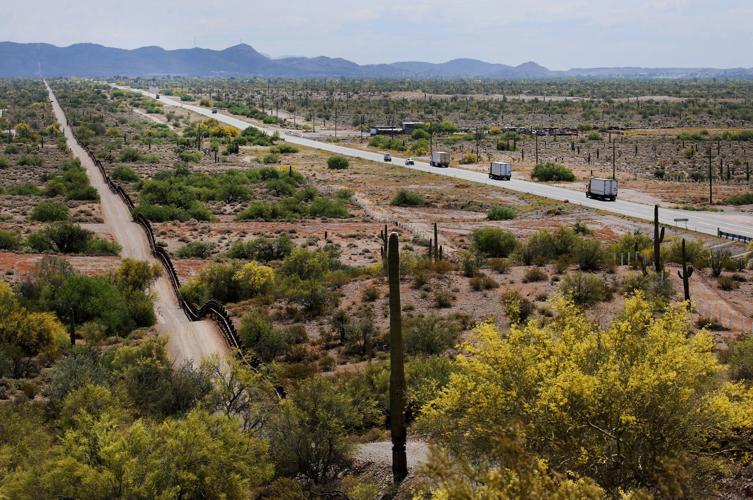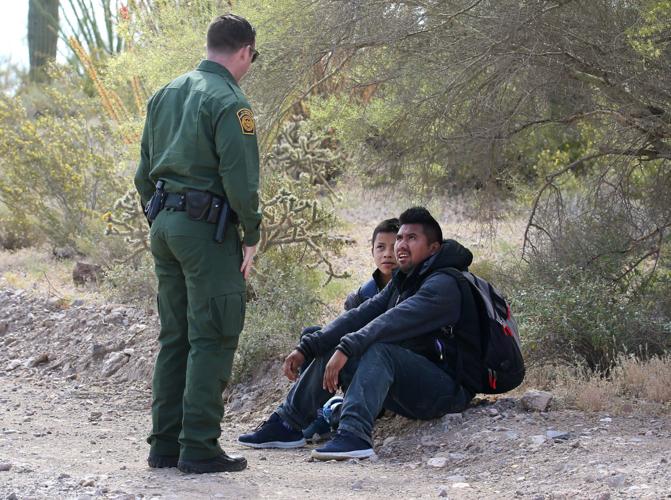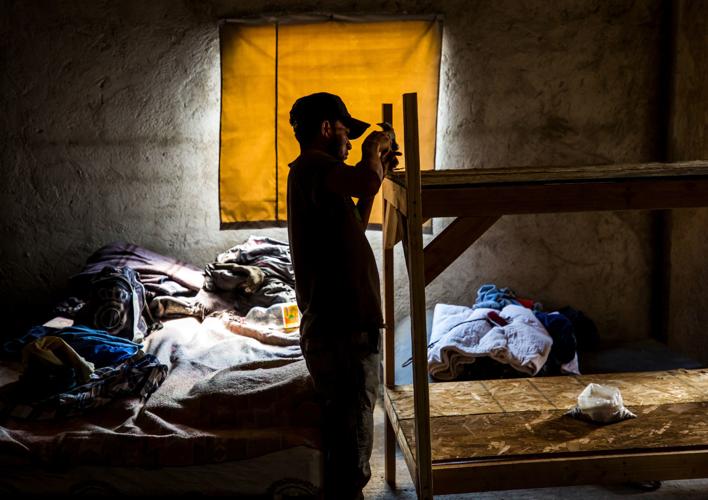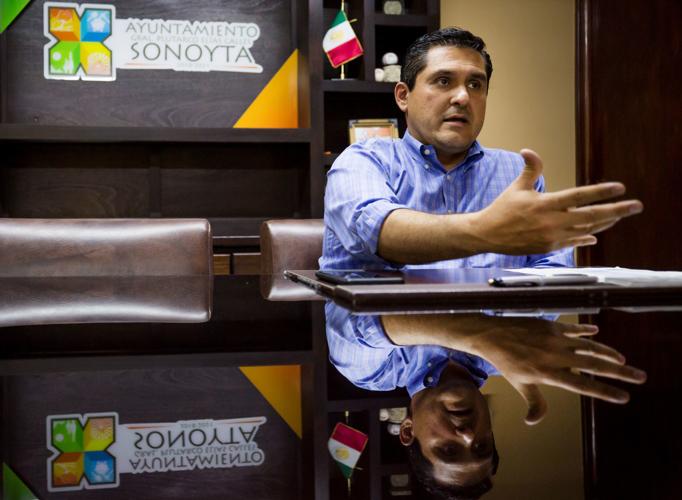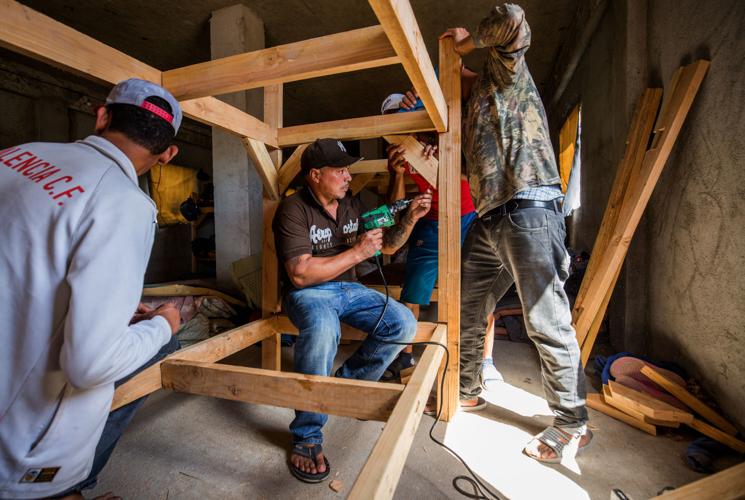Try as they might, the Ramirez family could not get anybody to drive them to the border west of Lukeville, the last step in a long journey from Honduras to the United States.
The family of four were stuck in Sonoyta, the Mexican border town south of Luke-ville, after fleeing a gang that took over their neighborhood in Honduras.
They needed somebody to take them to the Mexican highway that runs parallel to the border for a dozen miles west of town, but taxi drivers in Sonoyta said they feared drug traffickers along that stretch of highway.
Finally, a woman took pity on Oscar Ramirez, his wife, Alba, and their 16-year-old son and 14-year-old daughter.
She agreed to drive them to the border on one condition: “She said, ‘I’m going to take you to the highway near the border, but you have to get out fast. If anybody sees me, they could kill me, because everybody works for the narcos,’” Ramirez said Thursday afternoon outside the former Benedictine Monastery in Tucson, which is now a temporary shelter.
They paid her 100 pesos, or about six dollars, for gas. Around 4 a.m., they slipped out of the hotel where they were staying in Sonoyta. As they drove to a spot 3 miles west of town, the woman explained what they should do after they crossed.
“She told us not to walk far, that we should look for a road where the Border Patrol goes and wait there,” Ramirez said. “And that’s what we did.”
They hustled across 50 yards of brush that separates the highway and the border, ducked under the post-and-rail vehicle barrier on the border, and waited by a road. Border Patrol agents picked them up within an hour.
After a few days in custody, the family was taken to the monastery, Ramirez said as he sat with his family under an Arizona ash tree outside the monastery. Dozens of children’s toys were spread out under the tree, part of a massive donation effort for hundreds of families who stayed at the monastery in recent months.
The Ramirez family crossed the border in the same area west of Lukeville, about 150 miles southwest of Tucson, as hundreds of families from Honduras and Guatemala in recent months, including nearly 400 people on April 16 who stepped off buses on the Mexican highway and walked across the border.
The Border Patrol’s Tucson Sector, which includes Lukeville, saw about 6,750 people surrender while traveling as families from October to March. This amounted to a 230% increase from the same period in the previous fiscal year.
In response to large groups crossing the border together, the Tucson Sector issued news releases highlighting about 2,300 people who crossed the border together in large groups since October, almost all near Lukeville.
The dramatic crossings of large groups spurred news releases and headlines, but many families in the Tucson Sector actually cross like the Ramirez family: A few people at a time surrender to agents working out of the Ajo Station, which covers Lukeville, and the Casa Grande Station, the sector’s public affairs office said in response to an inquiry from the Star.
“How it works now”
On Tuesday morning, a man in a red button-down shirt and a boy wearing a brown leather jacket walked out of the brush northwest of Lukeville, sat down next to a dirt-and-gravel road, and waited for agents to drive by.
When agents approached the father, a 31-year-old Guatemalan citizen, he was ready with a manila folder containing the birth certificate of his 11-year-old son and their destination in the United States.
The father and son traveling by themselves “exemplify how it works” now, Agent Joseph Curran said. He said another pair were detained earlier that morning and agents were still looking for two more people.
Some families cross the border and then stop and wait, Curran said. Others flag down agents, walk toward camera towers perched on top of nearby hills, or walk along Puerto Blanco Drive, a public road that meanders along the border in Organ Pipe Cactus National Monument.
Looking down from a hill west of Lukeville, Curran said agents keep a sharp eye on passenger buses on the Mexican highway just south of the border. They never know if the next bus is going to stop and let out dozens of people who will start walking toward the border.
When large groups surrender, agents transport them to the Ajo Station and later to Tucson, Curran said.
Kids have to be in car seats and adults must have a seat belt, making it a time-consuming endeavor to move hundreds of people, often in three-passenger Border Patrol trucks. At times, the agency has shut checkpoints so agents could help transport families.
Curran said the area west of Lukeville is “completely cartel controlled.” When it comes to large family groups, he suspects the timing and sizes of the groups are meant to divert more agents to a specific area.
Agents regularly arrest people hauling backpacks of marijuana in the smuggling corridors near Lukeville, U.S. District Court records show. Some are professional smugglers, while others are migrant men who can’t afford to pay the smuggling fee to cross the border.
Mountaintop scouts with binoculars and encrypted radios guide them through the desert and away from areas where agents are patrolling, court records show.
Waiting in Sonoyta
Across the border in Sonoyta, Mayor Jose Ramos said large migrant groups rarely, if ever, interact with the city’s residents.
Ramos said he couldn’t know everything that happens on the highway west of Sonoyta, but if hundreds of families showed up and stayed the night in the city of about 18,000 inhabitants, everybody would notice.
Jose Flores, a city official who works weekends at his family’s truck stop on the highway west of town, said most of the Honduran and Guatemalan families that come to the truck stop are on their way to Tijuana.
On one occasion, he saw a Central American family who planned to cross the border west of Lukeville, he said.
“They got off the bus and bought food, bought water, and right there they wanted to cross,” Flores said.
The people at the truck stop discouraged the family from walking through the desert, where the nearest town is nearly 30 miles away, Flores said. “But they said, ‘No, no, I want them to catch me.’”
Curran was quick to point out not all migrants who cross near Lukeville are looking to get caught. Some are trying to get through the desert to Interstate 8, he said.
Border Patrol statistics show 22,600 single adults were apprehended from October to March in the Tucson Sector, a slight increase from the same period last year.
In Sonoyta, a makeshift migrant shelter housed men on Tuesday who were fleeing the same poverty and violence in Guatemala and Honduras as the family groups, but had a harder time crossing the border.
Some had spent months waiting in Sonoyta. They did odd jobs around town while they figured out how to cross into the United States.
Dozens of men played cards in the shade of tarps hung from beams. One man used clippers to give haircuts, and a toothbrush to smooth out the finer, close-cropped areas. Others efficiently built bunk beds from plywood and wood.
Julio Herrera, 32, said he has children in Honduras, which could have helped him cross the U.S.-Mexico border if he brought them with him. But unlike for some families with money or collateral, Herrera said bus tickets through Mexico were out of reach.
Without the relative safety of a bus ride, he said he didn’t want to put his children at risk on the long trek.
“Treated Like kings”
Back at the Tucson monastery, volunteers provided families with meals, racks of clothes, showers and numerous other amenities.
Drawings by children covered the walls of one room and spilled out into the hallway. They drew eagles, flowers, horses and snakes, alongside Spider-Man and a blue-and-yellow “minion” from a popular movie series.
A flat-screen monitor in another room, run by a local high school student, showed when each family was scheduled to be driven to a bus station in Tucson. From there, they were headed to Colorado Springs; Sioux City, Iowa; Oakland, California; Memphis, Tennessee; and elsewhere.
On Thursday, the Ramirez family was preparing to head to California to live with a friend while their immigration proceedings unfold.
While in Honduras, “we told her what was happening to us and she said she would help any way she could,” Alba said.
Two years ago, members of the “Mara MS” gang “flooded” the neighborhood where the Ramirez family lived in Honduras. The next day, the gang members started robbing, beating and raping neighborhood residents.
The gang killed a man who lived a few doors down from the Ramirez family. Four blocks away, the gang was extorting a man out of half his salary.
“I decided we should leave after they conquered the neighborhood and went to the schools,” Ramirez said, as Alba wiped the corners of her eyes. The gang members offered the schoolchildren drugs, money, cellphones and guns.
Soon, it was common to see a child as young as 9 or 10 years old sitting on a street corner with a pistol on his hip, Ramirez said. They would set up robberies by texting the license plates of nonresidents who drove into the neighborhood.
The final straw came when his son told him “‘Dad, they’re offering me a gun, a cellular. When I leave school, they want me to go to the (street) corner,’” Ramirez said.
Ramirez left by himself so as not to arouse the suspicions of the gang members. A few days later, Alba and their children left Honduras without a word to anybody.
Ramirez stayed three days ahead of his family so he could help them avoid trouble. He found safe places to sleep, checked where immigration checkpoints were located, and noticed Mexican immigration officials rarely checked buses at night.
After weeks of tough travel through Mexico, “they treated us like kings here,” Ramirez said of the monastery.


